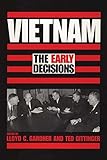Vietnam : The Early Decisions / ed. by Ted Gittinger, Lloyd C. Gardner.
Material type: TextPublisher: Austin : University of Texas Press, [2021]Copyright date: ©1997Description: 1 online resource (238 p.)Content type:
TextPublisher: Austin : University of Texas Press, [2021]Copyright date: ©1997Description: 1 online resource (238 p.)Content type: - 9780292799400
- 327.73059709046
- online - DeGruyter
| Item type | Current library | Call number | URL | Status | Notes | Barcode | |
|---|---|---|---|---|---|---|---|
 eBook
eBook
|
Biblioteca "Angelicum" Pont. Univ. S.Tommaso d'Aquino Nuvola online | online - DeGruyter (Browse shelf(Opens below)) | Online access | Not for loan (Accesso limitato) | Accesso per gli utenti autorizzati / Access for authorized users | (dgr)9780292799400 |
Frontmatter -- Contents -- Acknowledgments -- Introduction -- PART I. THE POLITICAL CONTEXT -- Vietnam. An Episode in the Cold War -- A Way of Thinking. The Kennedy Administration s Initial Assumptions about Vietnam and Their Consequences -- From the Colorado to the Mekong -- Hanoi's Response to American Policy, 1961-1965. Crossed Signals? -- PART II. THE MILITARY CONTEXT -- The Zen of Escalation. Containment and Commitment in Southeast Asia -- Conspiracy of Silence: LBJ, the Joint Chiefs, and Escalation of the War in Vietnam -- PART III. KENNEDY AND JOHNSON -- Lyndon Johnson and the Legacy of Vietnam -- The Kennedy-Johnson Transition. The Case for Policy Reversal -- NSAM 263 and NSAM 273. Manipulating History -- PART IV. THE SOVIET DIMENSION -- Turnabout? The Soviet Policy Dilemma in the Vietnamese Conflict -- Contributors -- Index
restricted access online access with authorization star
http://purl.org/coar/access_right/c_16ec
Haunting questions remain about our involvement in Vietnam. Perhaps the most persistent of these is whether President Kennedy would have ended American involvement in Vietnam if he had lived. For many Americans, Oliver Stone's film JFK left no doubt that before his assassination Kennedy had determined to quit Vietnam. Yet the historical record offers a more complex answer. In this fresh look at the archival evidence, noted scholars take up the challenge to provide us with their conclusions about the early decisions that put the United States on the path to the greatest American tragedy since the Civil War. The tensions and turmoil that accompanied those decisions reveal the American presidency at the center of a storm of conflicting advice. The book is divided into four sections. Parts one and two delve into the political and military contexts of the early decisions. Part three raises the intriguing questions of Kennedy's and Johnson's roles in the conflict, particularly the thorny issue of whether Kennedy did, in fact, intend to withdraw from Vietnam and whether Johnson reversed that policy. Part four reveals an uncanny parallel between early Soviet policy toward Hanoi and U.S. policy toward Saigon.
Mode of access: Internet via World Wide Web.
In English.
Description based on online resource; title from PDF title page (publisher's Web site, viewed 26. Apr 2022)


